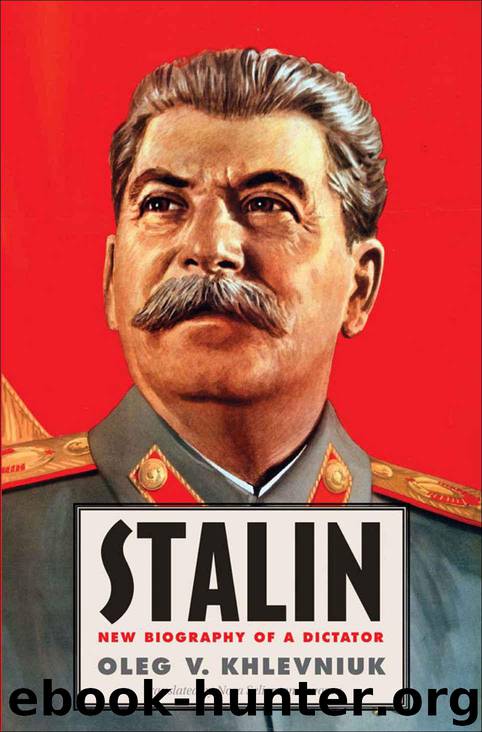Stalin: New Biography of a Dictator by Khlevniuk Oleg V

Author:Khlevniuk, Oleg V. [Khlevniuk, Oleg V.]
Language: eng
Format: azw3
Publisher: Yale University Press
Published: 2015-05-18T16:00:00+00:00
THE STATE DEFENSE COMMITTEE
Stalin’s actions during the war’s first days were frenetic, confused, and reactive. Even though he did not grasp the situation and was not qualified to manage armies, he tried to do something simply because it was impossible to do nothing. He tried desperately (and incompetently) to strike back at the Germans. Many, if not most, of these efforts only made matters worse.
Stalin clearly understood the dangers facing his country. There is convincing evidence that during the war’s very first days he tried to barter away Western portions of the USSR in exchange for a truce. Beria was assigned to arrange a meeting between his representative and the Bulgarian ambassador, whose country was allied with the Nazis. The Bulgarian ambassador was asked to determine what conditions might be acceptable for a peace with Berlin. What lands was Germany claiming?25 Just how this initiative ended is unknown. Probably the Bulgarian ambassador was reluctant to act as an intermediary. But the attempt itself speaks volumes. Whether Stalin was truly prepared to give up Soviet lands or was just hoping to break the momentum of Germany’s offensive, he clearly felt less than confident about the Red Army’s defensive capabilities.
This negotiation attempt was not the only sign of Stalin’s pessimism. In parallel with a general mobilization and the preparation of new defensive lines in the interior, he ordered a massive evacuation campaign during the war’s earliest days. Not only were people and material resources moved away from the front line, but a secret evacuation of the capital got under way, even though the Germans were nowhere near. On 27 June the Politburo approved an order to urgently (within three days) remove from Moscow the government’s precious metal and gem reserves, the Soviet Diamond Fund, and valuables held in the Kremlin armory. On 28 June it was decided that currency held in Moscow’s Gosbank and Gosznak depositories should be immediately relocated, and on 29 June, that the commissariat apparats and other top government offices should be moved to the rear. On 2 July the Politburo resolved to move Lenin’s sarcophagus from his tomb in Red Square to Siberia, and on 5 July, to move government and Central Committee archives.26
An official summoned to Stalin’s office on 26 June later recalled the following: “Stalin did not look his usual self. He didn’t just look tired. He had the appearance of someone who had endured a profoundly upsetting experience. Until I met with him, I had a feeling based on various pieces of circumstantial evidence that we were taking a heavy beating along the borders. Maybe defeat was looming. After I saw Stalin, I understood that the worst had already happened.”27 The next few days brought no relief. Stalin was increasingly aware of the futility of his orders and how difficult it was to manage the army.
Just a week after the war began, alarming news reached Moscow about the grave situation along the Western Front and that Minsk, the capital of Belarus, had already fallen into enemy hands.
Download
This site does not store any files on its server. We only index and link to content provided by other sites. Please contact the content providers to delete copyright contents if any and email us, we'll remove relevant links or contents immediately.
| France | Germany |
| Great Britain | Greece |
| Italy | Rome |
| Russia | Spain & Portugal |
Fanny Burney by Claire Harman(25790)
Empire of the Sikhs by Patwant Singh(22176)
Out of India by Michael Foss(16313)
Leonardo da Vinci by Walter Isaacson(11913)
Small Great Things by Jodi Picoult(6105)
The Six Wives Of Henry VIII (WOMEN IN HISTORY) by Fraser Antonia(4797)
The Wind in My Hair by Masih Alinejad(4427)
The Lonely City by Olivia Laing(4122)
The Crown by Robert Lacey(4111)
A Higher Loyalty: Truth, Lies, and Leadership by James Comey(4038)
The Iron Duke by The Iron Duke(3643)
Millionaire: The Philanderer, Gambler, and Duelist Who Invented Modern Finance by Janet Gleeson(3574)
Sticky Fingers by Joe Hagan(3456)
Alive: The Story of the Andes Survivors by Piers Paul Read(3317)
Papillon (English) by Henri Charrière(3276)
Joan of Arc by Mary Gordon(3263)
Stalin by Stephen Kotkin(3089)
Aleister Crowley: The Biography by Tobias Churton(3024)
Ants Among Elephants by Sujatha Gidla(2927)
